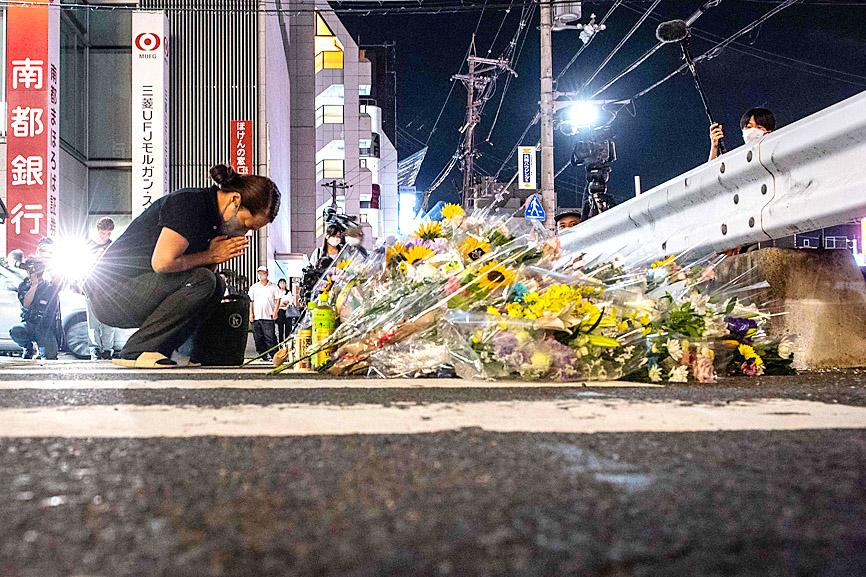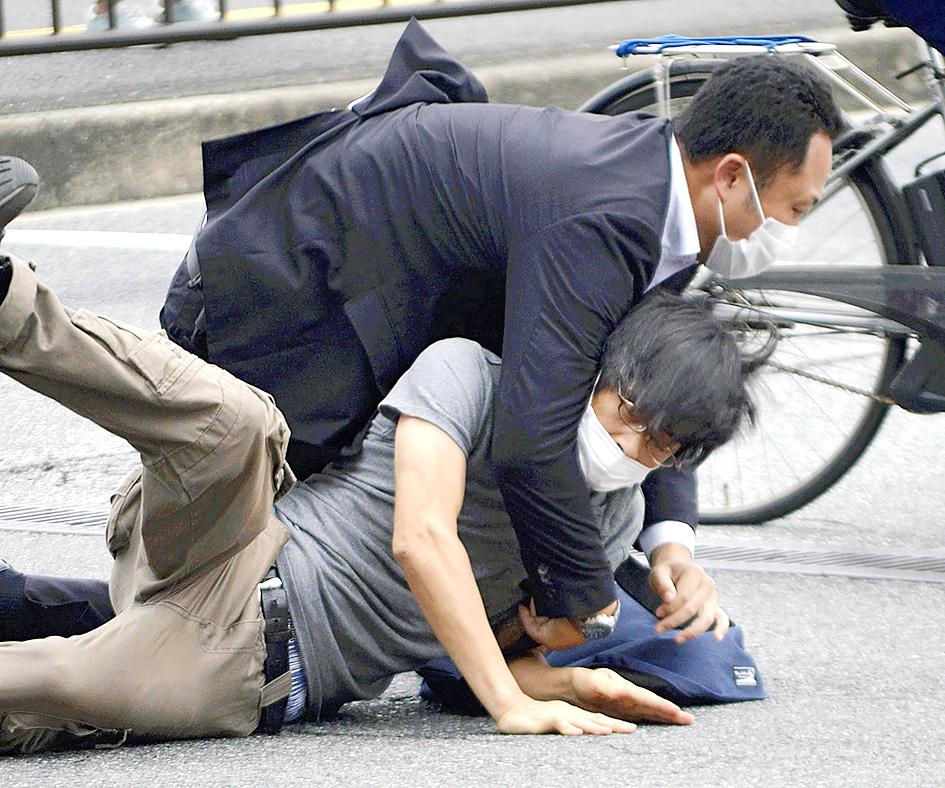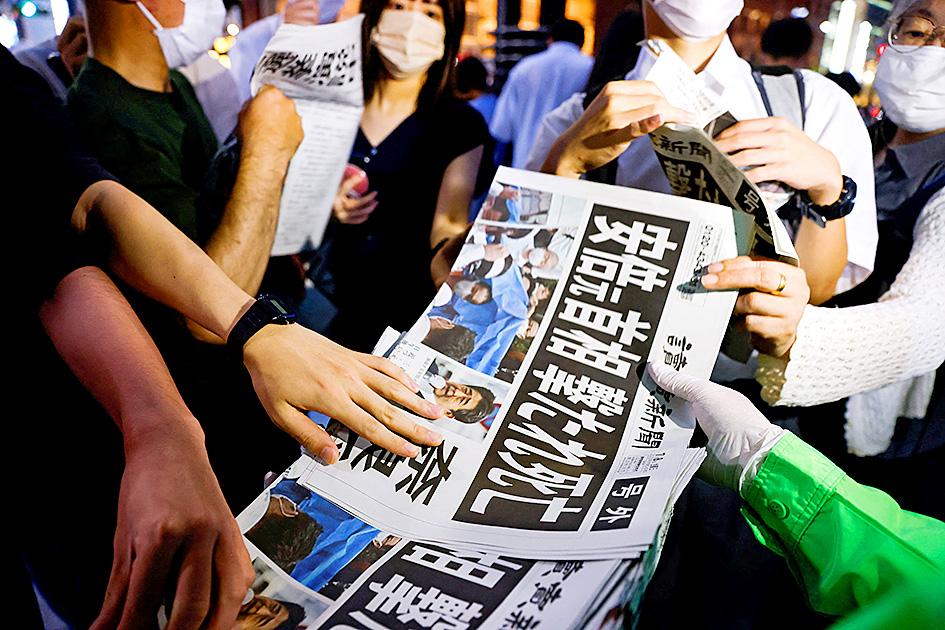Former Japanese prime minister Shinzo Abe was yesterday assassinated on a street in western Japan by a gunman who opened fire from behind as he delivered a campaign speech.
The 67-year-old Abe, who was Japan’s longest-serving leader when he resigned in 2020, collapsed bleeding and was airlifted to a nearby hospital in Nara, although he was not breathing and his heart had stopped.
He was later pronounced dead after receiving massive blood transfusions, officials said.

Photo: AFP
Nara Medical University emergency department director Hidetada Fukushima said Abe suffered major damage to his heart, along with two neck wounds that damaged an artery.
He never regained his vital signs, Fukushima said.
Police arrested the suspected gunman at the scene of the attack and identified him as Tetsuya Yamagami, 41, a former member of the Japanese navy.

Photo: AP
Broadcaster NHK reported that Yamagami said he wanted to kill Abe because he had complaints about him unrelated to politics.
Dramatic video from NHK showed Abe standing and giving a speech outside a train station in Nara ahead of tomorrow’s parliamentary election. As he raised his fist to make a point, two gunshots rang out, and he collapsed holding his chest, his shirt smeared with blood as security guards ran toward him.
Guards leapt onto the gunman, who was face down on the pavement. A double-barreled device that appeared to be a handmade gun was seen on the ground.

Photo: Reuters
Japanese Prime Minister Fumio Kishida and his Cabinet ministers hastily returned to Tokyo from campaign events around the country after the shooting, which he called “dastardly and barbaric.”
He pledged that the election, which chooses members for parliament’s less-powerful Japanese House of Councilors, would go on as planned.
“I use the harshest words to condemn” the act, Kishida said, struggling to control his emotions.
He said that the Japanese government planned to review the security situation, but added that Abe had the highest protection.
Even though he was out of office, Abe was still highly influential in the governing Liberal Democratic Party and headed its largest faction, Seiwakai.
Opposition leaders condemned the attack as a challenge to Japan’s democracy.
In Tokyo, people stopped on the street to grab extra editions of newspapers or watch TV coverage of the shooting.
When he resigned as prime minister, Abe said he had a recurrence of the ulcerative colitis he had had since he was a teenager.
He told reporters at the time that it was “gut-wrenching” to leave many of his goals unfinished.
He said he had failed to achieve a revision of Japan’s war-renouncing constitution, a goal that made him a divisive figure.
However, Abe said he was proud to have strengthened Japan’s security alliance with the US and shepherded the first visit by a serving US president to Hiroshima, one of two cities on which the US in World War II dropped an atomic bomb.
Serving as prime minister from 2006 to 2007 and from 2012 to 2020, Abe won six national elections and built a rock-solid grip on power, bolstering Japan’s role in the Indo-Pacific region. He also stepped up patriotic education at schools and raised Japan’s international profile.

INVESTIGATION: The case is the latest instance of a DPP figure being implicated in an espionage network accused of allegedly leaking information to Chinese intelligence Democratic Progressive Party (DPP) member Ho Jen-chieh (何仁傑) was detained and held incommunicado yesterday on suspicion of spying for China during his tenure as assistant to then-minister of foreign affairs Joseph Wu (吳釗燮). The Taipei District Prosecutors’ Office said Ho was implicated during its investigation into alleged spying activities by former Presidential Office consultant Wu Shang-yu (吳尚雨). Prosecutors said there is reason to believe Ho breached the National Security Act (國家安全法) by leaking classified Ministry of Foreign Affairs information to Chinese intelligence. Following interrogation, prosecutors petitioned the Taipei District Court to detain Ho, citing concerns over potential collusion or tampering of evidence. The

‘FORM OF PROTEST’: The German Institute Taipei said it was ‘shocked’ to see Nazi symbolism used in connection with political aims as it condemned the incident Sung Chien-liang (宋建樑), who led efforts to recall Democratic Progressive Party (DPP) Legislator Lee Kun-cheng (李坤城), was released on bail of NT$80,000 yesterday amid an outcry over a Nazi armband he wore to questioning the night before. Sung arrived at the New Taipei City District Prosecutors’ Office for questioning in a recall petition forgery case on Tuesday night wearing a red armband bearing a swastika, carrying a copy of Adolf Hitler’s Mein Kampf and giving a Nazi salute. Sung left the building at 1:15am without the armband and apparently covering the book with a coat. This is a serious international scandal and Chinese

Seventy percent of middle and elementary schools now conduct English classes entirely in English, the Ministry of Education said, as it encourages schools nationwide to adopt this practice Minister of Education (MOE) Cheng Ying-yao (鄭英耀) is scheduled to present a report on the government’s bilingual education policy to the Legislative Yuan’s Education and Culture Committee today. The report would outline strategies aimed at expanding access to education, reducing regional disparities and improving talent cultivation. Implementation of bilingual education policies has varied across local governments, occasionally drawing public criticism. For example, some schools have required teachers of non-English subjects to pass English proficiency

TRADE: The premier pledged safeguards on ‘Made in Taiwan’ labeling, anti-dumping measures and stricter export controls to strengthen its position in trade talks Products labeled “made in Taiwan” must be genuinely made in Taiwan, Premier Cho Jung-tai (卓榮泰) said yesterday, vowing to enforce strict safeguards against “origin laundering” and initiate anti-dumping investigations to prevent China dumping its products in Taiwan. Cho made the remarks in a discussion session with representatives from industries in Kaohsiung. In response to the US government’s recent announcement of “reciprocal” tariffs on its trading partners, President William Lai (賴清德) and Cho last week began a series of consultations with industry leaders nationwide to gather feedback and address concerns. Taiwanese and US officials held a videoconference on Friday evening to discuss the